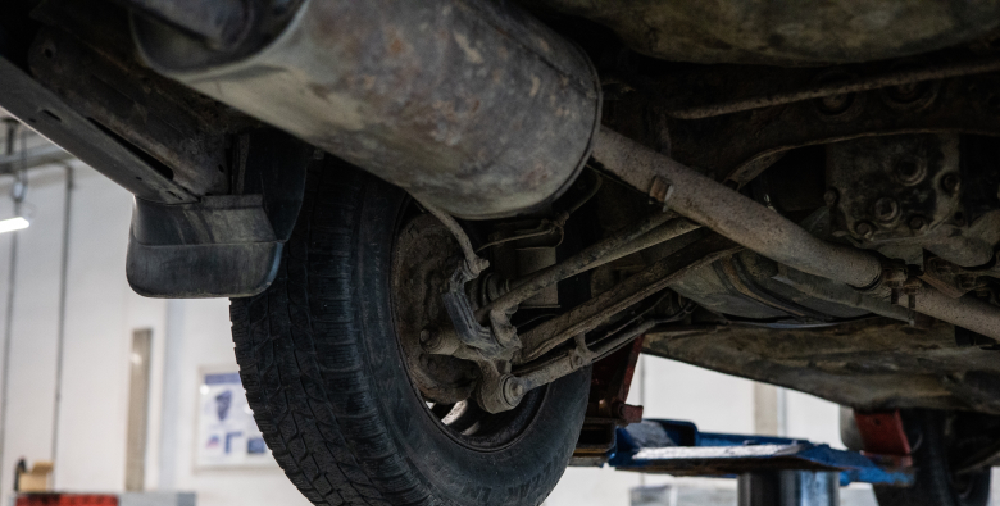Why have a regular catalytic converter service? The short answer means better fuel economy, emissions control, and performance. However, you can find several other reasons not to wait until you see that “check engine light” before checking this fascinating component.
In this post, the Performance Muffler team explains more about how catalytic converters work and the potential faults you may experience.
What Does a Catalytic Converter Do?
A catalytic converter breaks down harmful emissions such as nitric oxide and carbon monoxide into less hazardous substances. For example, it will convert carbon monoxide into water vapor and carbon dioxide.
How Does This Device Operate?
A catalytic converter has a honeycomb structure, much like a beehive. This gives manufacturers a greater surface area while conserving space. Instead of honey, precious metals like rhodium, palladium, and platinum coat this structure.
These metals act as catalysts that cause the chemical reactions that render toxic fumes inert. When your vehicle runs, the engine creates exhaust fumes and feeds these into the catalytic chamber. The chamber heats up, and the combination of the heat and contact with the catalyst breaks down the exhaust fumes.
How Many Catalytic Converters Are in Your Car?
It might surprise you to learn that high-end vehicles have two catalytic converters. These chambers sit adjacent to one another to maximize harmful emissions. Vehicles with more than one exhaust pipe will have a converter for each pipe.
However, the standard vehicle on the road in America today operates with a single converter. This makes a catalytic converter service quick and relatively inexpensive.
What Problems Might You Experience?
Catalytic converters are simple, with few moving parts, and should last about 10 years. However, several issues may influence their lifespan. These include faulty spark plugs, inefficient air/fuel mixtures, incorrect timing, and bad oxygen sensors.
These issues can cause the unit to overheat and literally cause a meltdown. The honeycomb structure breaks down, making the unit less effective. Unfortunately, you won’t know this without opening up the chamber, making a regular catalytic converter service crucial.
Other issues include a clogged catalytic converter due to:
- Oil leaks
- Anti-freeze leaks
- Damaged valve seals
- Worn pistons
- Failed gaskets
Dealing with these quickly makes repairs simple. However, if you ignore these issues, you will need an expensive catalytic converter replacement.
What Are the Signs of Catalytic Converter Issues?
The problem with this system is that the signs of failure can resemble many other issues. Aside from booking a catalytic converter service in Phoenix, there is no way to tell for certain. However, look out for the following signs.
Poor Acceleration
Poor acceleration may be due to a restriction in airflow due to a clogged converter. You will also notice that the engine performance seems sluggish and lacking in its normal power. Consider this an urgent issue as it can lead to engine failure.
High Fuel Consumption
If you have to fill up more than usual, it often indicates that the car is battling to accelerate. To compensate, the engine uses more fuel than usual. It pumps more fuel into the pistons to improve performance.
A Rattling Sound
This sign can also point to a broken catalytic converter and give you the warning to stop driving the car and seek help. It usually means that the honeycomb structure is loose and shedding pieces of metal. The danger is that these shards may work their way into the muffler and engine and cause damage.
The Engine Light Turns On
Modern vehicles use oxygen sensors to ensure the converter operates at peak efficiency. If the sensor detects an issue, it triggers the “check engine light.” While this could relate to several issues, if performance is bad and fuel consumption high, you probably have a problem with the converter.
The Smell of Sulfur
If the car emits a smell reminiscent of rotten eggs while running, it’s a sure sign you need a catalytic converter service. Sulfide is a natural by-product of burning gasoline. However, a converter, when working properly, converts this into odorless sulfur dioxide.
How To Best Correct These Issues
Your best option lies in trusting professional mechanics who specialize in the installation, repair, and maintenance of these components. You can easily damage the delicate structure during cleaning if you don’t have the proper tools or equipment.
A service costs far less than replacing the entire component, so leave it to the professionals instead. In addition to repairing these issues, we can optimize your converter’s operation and help you improve fuel efficiency.
We can ensure maximum operational efficiency to help you reduce your vehicle’s emissions. This enables you to contribute to a cleaner, healthier environment for you and your family. It also improves the lifespan of your engine and overall fuel efficiency, saving you money in the long run.
Your Professional Catalytic Converter Service in Phoenix, AZ, and Surrounding Areas
When last did someone take a look at your catalytic converter? Don’t feel bad if you don’t remember. Very few people understand the importance of regular checks and how they relate to a vehicle’s performance.
Now that you do understand, however, it’s time to schedule your affordable catalytic converter service. Let us take a look, clean the system thoroughly, and advise you on further improvements to your car’s performance.
Call Performance Muffler at (602) 691-6494 today to schedule your service and optimize your vehicle’s performance!

